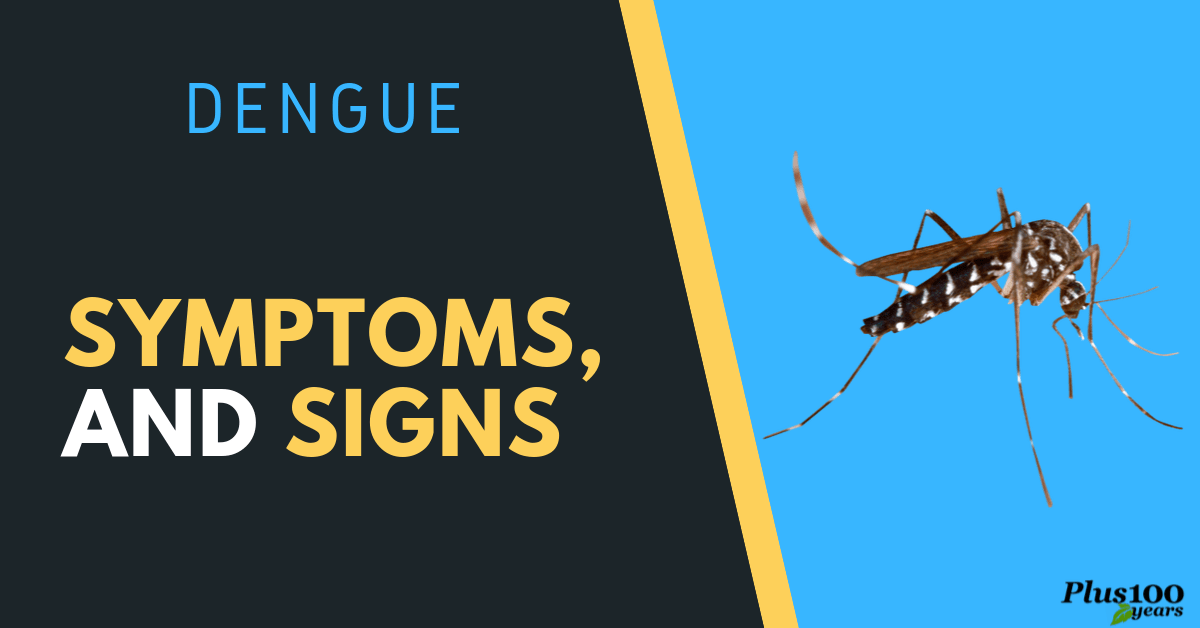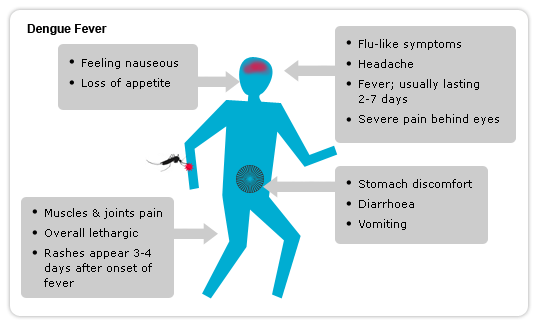
Dengue is dangerous and it can even cause death if the preventive measures are not taken in advance. Dengue germs are borne mosquitoes, which bite victims to spread dengue. However, dengue fever patients can recover in the event of the early diagnosis of this lethal fever. Good treatment and timely care are helpful to patients to have good health overtaking physical disorder.
At present, four distinct dengue serotypes have been identified including DEN1, DEN 2, DEN 3 and DEN 4.
Symptoms and Signs
- Patients need to be familiar with symptoms of dengue to have quick safeguards. They should not dither to go to the local clinics for treatment after detecting dengue. However, in some cases, there is proximity between dengue and other skin rashes such as measles.
- This life-threatening disease weakens patients who experience frequent bleeding, episodes of fatigue and abrupt nosedive in the quantity of blood plasma platelets.
- Basic symptoms, which are visible/identifiable at the preliminary phase, are a headache, fever, pain in the joint muscles and the exhibition of large red spots on the skin.
- If patients are confused, they should ask doctors about the detection of dengue or measles for advanced treatment.
- Generally, the incubation period lasts between 3-14 days.
If any traveler who is infected or affected by fever starting after 7-14 days of the arrival at home can have a low risk of the onset of dengue.

The way of Transmission of Dengue Fever
- Mosquitoes are vehicles to transport this deadly germ. Aedes type mosquito is mainly responsible to carry germs of dengue. Therefore, mosquitoes must be destroyed to prevent dengue. Until now, there is no particular vaccine or shot to minimize the risks of the spread of dengue. Therefore, find some easy preventive measures to stop the rapid expansion of dengue.
- Mosquito repellant substances should be used to end the lives of dengue germs. However, people must talk to experts before using such insecticides to destroy dengue.
- Houses must be disinfected and clean.
- Dengue germs should not be allowed to grow in the nooks and corners of the building.
- To control the transmission of dengue to people, clean waterlogged areas, develop sewerage systems and block ways of the entry of mosquitoes.
- During the night, mosquito nets must be used to avoid attacks of mosquitoes.
- In dengue high-risk areas people must undergo regular body check-ups, blood tests, and trials to know about the possibility of the occurrence of dengue.
- Surroundings must be detoxified.
- Join the environment cleaning team to keep the neighborhood and local drainage systems clean to control dengue.
- In this connection, local municipality and senior citizens must admit their duties to educate the young generation about the cons of this dengue disease.
Dengue Fever Classification
WHO or World Health Organization has classified dengue into two sub-heads:
- Severe
- Less intricate
Uncomplicated symptoms of dengue include fever, squeamish, pain in the muscles and appearance of some spots in the body. However, complicated or severe dengue forces patients to go to hospitals for medical care. Blood platelets drastically go down making patients infirm, feeble and incompetent. Shots are needed immediately to keep the balance in the percentage of blood platelets.
Broad Classification
- At the same time, modern scientists have done more classifications by categorizing dengue into I-IV.
- This grading system helps doctors to detect and prescribe medications to revive the energy of patients with dengue fever.
- Grade I is believed to be uncomplicated due to the presence of mild skin bruising with fluctuate body temperature.
- At the second phase or II levels, there is uninterrupted bleeding followed by body weakness.
- A doctor's advice is essential for those who need immediate treatment and further medical tests.
- Grades III and IV are considered to be complicated/severe because of the want of blood platelets.
During the exposure of this disease, patients who have a low level of blood platelets must be hospitalized for plantation of more platelets for recovery.
Diagnostic Procedures to Identify Dengue
- Before treating patients with medications, healthcare experts do recurrent medical trials, and blood screening.
- They perform tests to count platelets at the research labs before taking decisions for platelets transfer.
- At first, doctors collect samples of blood from the patients.
- The second stage of the microbiological tests includes compact blood testing, virus isolation, and proper platelets counting.
- Body antigen build-ups bring risks to patients who have a low capability to bear higher temperature and infection.
- PCR tests are conducted within the seven days of the appearance of symptoms of dengue.
- Nucleic acid testing is done through a PCR device.
- It makes the diagnosis more successful.
- This PCR test helps experts to do quick viral detection to trace dengue in the body of a patient.
Lab Tests for Detection of Dengue
- Before treating patients with medications, healthcare experts do recurrent medical trials, and blood screening.
- They perform tests to count platelets at the research labs before taking decisions for platelets transfer.
- At first, doctors collect samples of blood from the patients.
- The second stage of the microbiological tests includes compact blood testing, virus isolation, and proper platelets counting.
- Body antigen build-ups bring risks to patients who have a low capability to bear higher temperature and infection.
- PCR tests are conducted within the seven days of the appearance of symptoms of dengue.
- Nucleic acid testing is done through a PCR device.
- It makes the diagnosis more successful.
- This PCR test helps experts to do quick viral detection to trace dengue in the body of a patient.
Especially children with dengue fever lose competency and ability to feel healthy. Therefore, if the antigen levels become uncontrollable, urgent care needs to be taken for the prevention of dengue.
Counteracting Dengue Symptoms
- Doctors have no specific medications to recommend for the removal of dengue disease. Patients are still deprived of getting such powerful medications to have faster relief from dengue. However, there are some useful tips for you to manage dengue at the initial stage.
- Dengue increases body temperature and lowers down the number of blood platelets to create much long-lasting physical discomfiture.
- Dengue patients must take some medications to control the temperature.
- When dengue becomes severe, patients have to bear pain and stress. Intake of pain removal pills like acetaminophen enables patients to get back provisional health hazards, stress, and trauma.
Note: Experts advise that dengue patients should not use aspirin at any cost to overcome the severe symptoms of dengue as it can cause serious side effects.
- Patients must take distilled water to drink regularly.
- They should cleanse the body by drinking water to allow debris, toxins and dengue germs to go outside via urine.
In case dengue causes a rapid decrease in the blood platelets, they should be given new platelets for compensation.
Note: It is very much important to have disinfected blood for transmission as infected blood can increase complications and may cause the introduction of other diseases or further reduction in the amount of platelet.
It has been observed that patients have suffered from cardiac disorders, high blood pressure and renal failure after a third party blood transmission was made to increase the blood platelets. That is why doctors prefer not to opt for platelet transmission if the blood platelets are 20000 or above.
Dengue Recovery
The recovery time for dengue includes 10 to 14 days, which is followed by one week's acute symptoms, and a few more days for recovery. Usually, the symptoms do not extend beyond two weeks.
Differentiating Between Dengue, Malaria and Chicken Guinea
Dengue, malaria and chicken guinea all three are mosquito-borne diseases and hence there can be confusion when it comes to perfectly diagnosing one out of three. Laboratory testing and identification through symptoms and signs play a key role in making a conclusive decision in this case.
Here are some of the indications that can help you to differentiate:
- Chicken guinea and dengue both are caused by the infected Aedes Agypti that are more active during the day time than night and usually breed in areas with the human population and more possible in clean and open water storage areas. On the other hand, malaria is caused due to Anopheles that is more prevalent during dusk, dawn and night.
- It takes 3 to 4 days for the symptoms of dengue to come to the fore, whereas the malarial symptoms start showing almost 2 weeks after the mosquito bite. Similarly, the symptoms of chicken guinea set in after a week from exposure to the Aedes Agypti.
- Surprisingly in all the three infections, the symptoms are almost similar such as temperature above 102 degrees F, severe headaches, sudden high fever, joint and muscle pain, anemia, vomiting, dizziness, and general weakness.
- Dengue can be differentiated from the other two as in dengue the fever comes, subsides, reappear, and is accompanied by skin rashes. Bleeding is an important part of dengue hemorrhagic fever that leads to low platelet count and WBC. This is not visible in the other two infections.
- Chickenguinea patients suffer from intense joint pains but there is no bleeding like in case of dengue. Similarly, in malaria, the fever is recurring but is accompanied by heat, sweating, and chills.
Note: No vaccines or proper medications are available for treating both dengue and chicken guinea and hence prevention and proper care during the infection is the only way out.
"We would greatly appreciate it if you kindly give some feedback on this article"
Add new comment